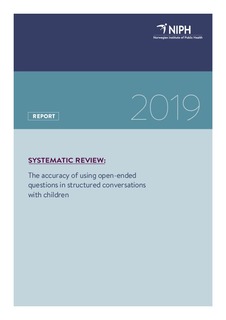The accuracy of using open‐ended questions in structured conversations with children: a systematic review
Berg, Rigmor; Munthe-Kaas, Heather Menzies; Baiju, Nikita; Muller, Ashley Elizabeth; Brurberg, Kjetil Gundro
Research report
Published version
Permanent lenke
http://hdl.handle.net/11250/2603572Utgivelsesdato
2019Metadata
Vis full innførselSamlinger
Sammendrag
Key message
When there is a suspicion of abuse, neglect or psychosocial problems in children, it is often necessary to interview children. But how to assess the credibility (truthfulness) of children’s statements is a difficult question. We aimed to assess the accuracy of using open-ended questions versus other types of questions in structured conversations with children.
Methods
We conducted a systematic review that compared the accuracy (truthfulness) of children’s statement when using open-ended questions versus more closed-ended types of questions.
Results
We included seven field studies. They were performed in England, Israel, USA, and Sweden and published in the years 1999-2009. The studies included 239 children ages 3-16. All studies were based on investigative interviews of children who were suspected victims of sexual abuse.
We grouped the seven studies into three types according to the methods used to judge whether the children’s statements were truthful or not: 1) CBCA (criteria-based content analysis) score, 2) contradictions, 3) confirmed allegations and confessions. The results showed that using open-ended questions elicited more accurate (truthful) information:
• All four studies that used CBCA score as their proxy for the truth found that open-ended questions retrieved more truthful descriptions than other types of questions (in one study, only in older children).
• The one study that used children’s self-contradictions as the proxy for the truth found that invitational (open-ended) questions retrieved more truthful descriptions than more focused questions.
• One of the two studies that used confirmed cases and perpetrator confessions as the proxy for the truth found that open-ended questions retrieved more accurate information than directive, option-posing or suggestive questions. The other study did not find this difference.
Findings from the seven included studies suggest that open-ended questioning seems to yield more credible information than focused questioning. However, more research is needed to draw firm conclusions.
